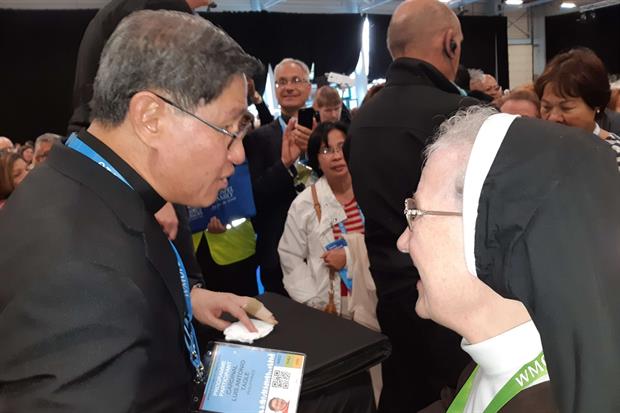
A difficult and painful topic, ancient and very current, that the Archbishop of Manila addressed by presenting different emotional states which aroused compassion and hilarity at the same time. “I arrived in Dublin at midnight and the fire alarm sounded at three in the hotel this morning… you will forgive me if I seem asleep, but if you don’t throw me out you will show mercy – he began -: you will choose life and not waste”.
A joke, certainly, but useful for introducing a profound reflection on what, without anyone even noticing , happens today in the world: “This culture of waste, of which Francis speaks to us since he was elected to the papal throne, is not his invention but has ancient roots. From the ’30s of the last century, when, after the great recession that also hit the United States, products were made so as to break soon.
It was necessary to sell, earn, start building up the money reserves of countries, so – Tagle explained quoting the texts of economic history – “programmed obsolescence” was created, in practice a new culture was gradually insinuated, capable of changing the brain and mentality of all of us: “Even if our car was still going very well, we were convinced that by now it was obsolete, old-fashioned, out of fashion, that in short we had to change it. They convinced us to feel dissatisfied”.
At that time, this mentality was not seen as a negative deviance but as being patriotic, we spent (consumed, threw away, bought again) for the good of the State, and consumers gradually, imperceptibly, supinely accepted this.
If this worked in the economic sphere, the big problems began when planned obsolescence migrated from the world of cars and washing machines “ permeating all cultures, also influencing values and priorities,the ways of seeing the creation and human beings” Citing texts from the 60’s (the economic boom) the Archbishop of Manila showed how things and people began to be evaluated on the basis of their “spend-ability” a criterion on which it was established what and who could be done without” … and the rest came as a result. Economists wrote that there was a need for more obsolescence, that “throwing away is beautiful”.
It is only in the 80s that social and environmental responsibility was born, an awareness of the “constant waste” that now even pollutes space, and finally from the 90s instead of asking when a product will become prematurely discarded we are concerned with increasing its life span.
“We must now examine our conscience – said Tagle -: we too were born and raised in a world that knows only the culture of waste and with this we are destroying our health, our well-being, our mentality. The Pope asks us to stop, the negative effects are by now devastating on our common home, which God created so beautiful”. The audience were shaken when he apparently seemed to joke and said “According to this culture, even your spouse is at some point affected by planned obsolescence and can be replaced… in the marriage certificate we should include an expiration date. I laugh, but it’s happening and it’s serious”.
Cardinal Tagle insisted that there are two texts by Francis which, although starting from different points of view, converge in a single conclusion: Laudato si’, “dedicated to the care of our common home”, and Amoris Laetitia, “exhortation on love in the family”. The Pope, in fact, speaks of “integral ecology”, including in it “human ecology”: “We must recover the sense of the person – Tagle warned – and this is the great contribution that Christianity must make today looking at the mystery of the Trinity, which is three people in one. The individual is isolated, the person is a relationship, so much so that our identity is born from the relationship we have with others, we call ourselves fathers if we have children, husbands if we have a wife, sisters if we have brothers, and if a child loses the relationship with his parents, he changes his name, he becomes an orphan …”. There is silence in the room, everyone is thinking about their own story and understands what he is saying . “We need to get out of the trap of individualism, to understand that we truly find ourselves only when we put the other in a central space in us. Otherwise, we will throw away any waste, that is, anyone who is useless, who steals our space, who does not bring us a profit”.
He was moved to tears when he cited an autobiographical anecdote. In 1973, his parents gave him a watch that even today he has on his wrist, it was a gift for his graduation . “Your Eminence, you are a walking museum, you should throw it away, now you are a cardinal, you deserve better”, he often hears. “But this is not just an object, this watch has a face, my parents got into debt to give me a gift, it will never be obsolete because it has the face of the love of my father and my mother. When they see it on me, they are happy, on Sunday they will have been married for 62 years” .
It’s not an exaggeration to say that today we also measure people according to their market value. It is the Pope himself who demonstrates specific cases , painfully, concretely, when quoting what happens daily : “Among the rejected, because they are worth nothing, are unborn children, aborted even before they come into the world, the elderly, the disabled, those who have made mistakes and are then throw away as criminals, men, women and children subject to human trafficking and turned into businesses, refugees, the discriminated, even if they have done nothing wrong … But they are people! People can’t be out of fashion.
As the international president of Caritas, he saw with his own eyes on the border between Macedonia and Greece “The coach driver asked despairing migrants, five times as much for the ticket… Need also makes business”.
This heartfelt appeal, received with a very long applause from the thousands of families, concluded the meeting: “Francis invites us to a personal conversion, let’s change our hearts, return to the roots of our spirituality, to Jesus, to the witness of the saints, let’s focus on relationships rather than on utilities”. We are not asked to save the world, but to make minimal gestures, “to move from waste to care, to fill the world with small gestures of goodness, it will be enough. I assure you that it will be enough to see discarded people be born again with new life, like the junkie who said to me ‘I am garbage, I have no hope’, but then years later I saw him again while helping others to save themselves: he had regained his value as part of God’s creation”.
Standing ovations, tears and smiles, like when a party ends !


